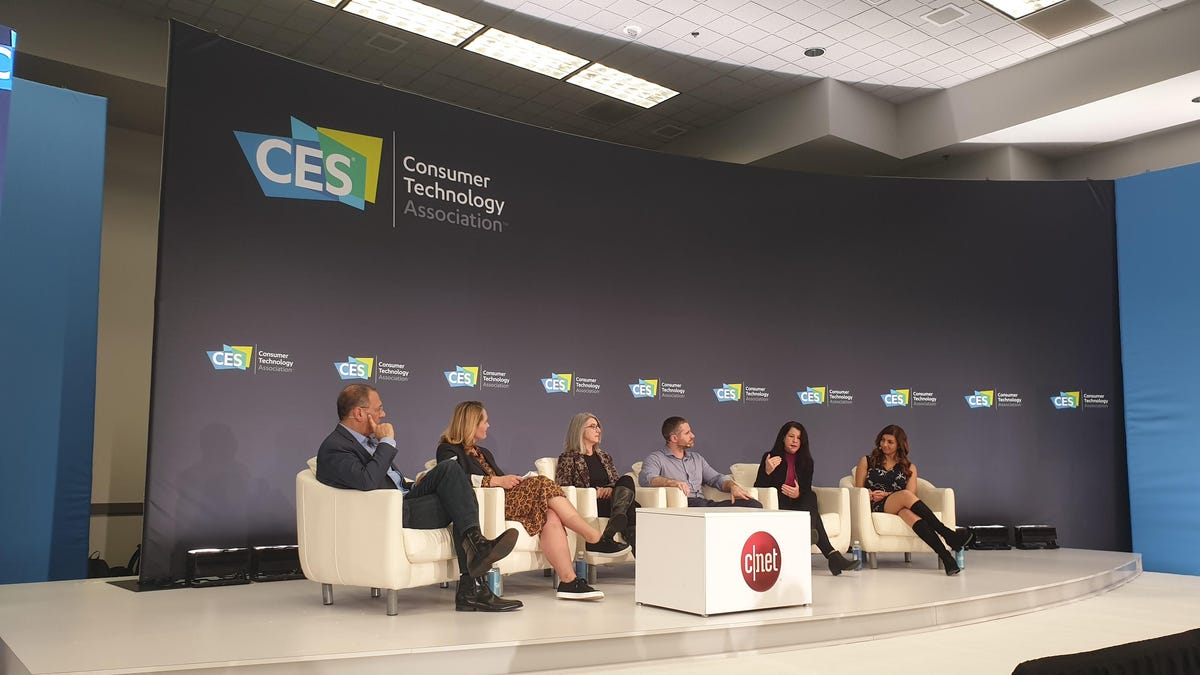CNET's CES 2020 Next Big Thing Panel focuses on anticipatory tech's wonders and dangers
Panelists from Google and other companies offer a sense of how smart home systems can work together and determine our needs before we do, but that's not always a good thing.

CNET's Brian Cooley, CBSi's Lindsey Turrentine, Electronic Frontier Foundation's Cindy Cohn, Loup Ventures' Doug Clinton, Google's Michele Turner and Affectiva's Rana El Kaliouby were the 2020 Next Big Thing panelists.
CNET's annual Next Big Thing was among the attractions of CES 2020, and this year's panel focused on anticipatory tech -- stuff that's designed to learn your habits and preferences, track routines and anticipate needs in real time. It encompasses your home, car and health.
Lindsey Turrentine, CBS Interactive senior vice president of content strategy, and CNET Editor at Large Brian Cooley talked to a panel of representatives from Google's smart home division, Affectiva, which develops software to recognize human emotions; Loup Ventures, a tech-centric venture capital firm; and digital rights group Electronic Frontier Foundation.
Michele Turner, senior director of Google Smart Home Ecosystem, said anticipatory tech was all about linking in-home devices "privately and security." She suggested a scenario in which Google Maps knows how long her evening commune would take so it'd activate her smart oven and thermostat at the right moment. It could also anticipate problems with your home and alert you accordingly.
Rana El Kaliouby, co-founder and CEO of Affectiva, said her company was "on a mission to humanize technology. She wants to anticipate data and algorithmic bias by collecting data from a variety of demographics and situations -- not just middle-class white men -- as anticipation our needs, desires and actions becomes a bigger priority for tech companies.
Doug Clinton, managing partner at Loup Ventures, noted that his company always considers the character of tech firms' founders when looking for places to invest. It's particularly focused on neurotech, which Clinton said has the potential to bring us a layer closer to the computer we use each day. He jokingly assured Cooley and the audience that he couldn't read their minds.
See also
Offering a skeptical viewpoint was Cindy Cohn, executive director of the Electronic Frontier Foundation. She expressed concern about the idea of giving more and more data to companies, especially when we know how it can be used collectively by companies and authorities.
"There's not enough thinking about how this could go wrong," she said, highlighting a recent incident in which a hacker used a Ring camera to harass an 8-year-old Mississippi girl in her bedroom.
CES 2020: All of the new smart home products, from smart locks to the Alexa shower head
See all photosCohn noted that data can easily be used to create surveillance state, as China has increasingly leaned on facial recognition software. She also outlined the concept of "adversarial interoperability" in Google's services -- it's hard to opt out of one without opting out of them all.

